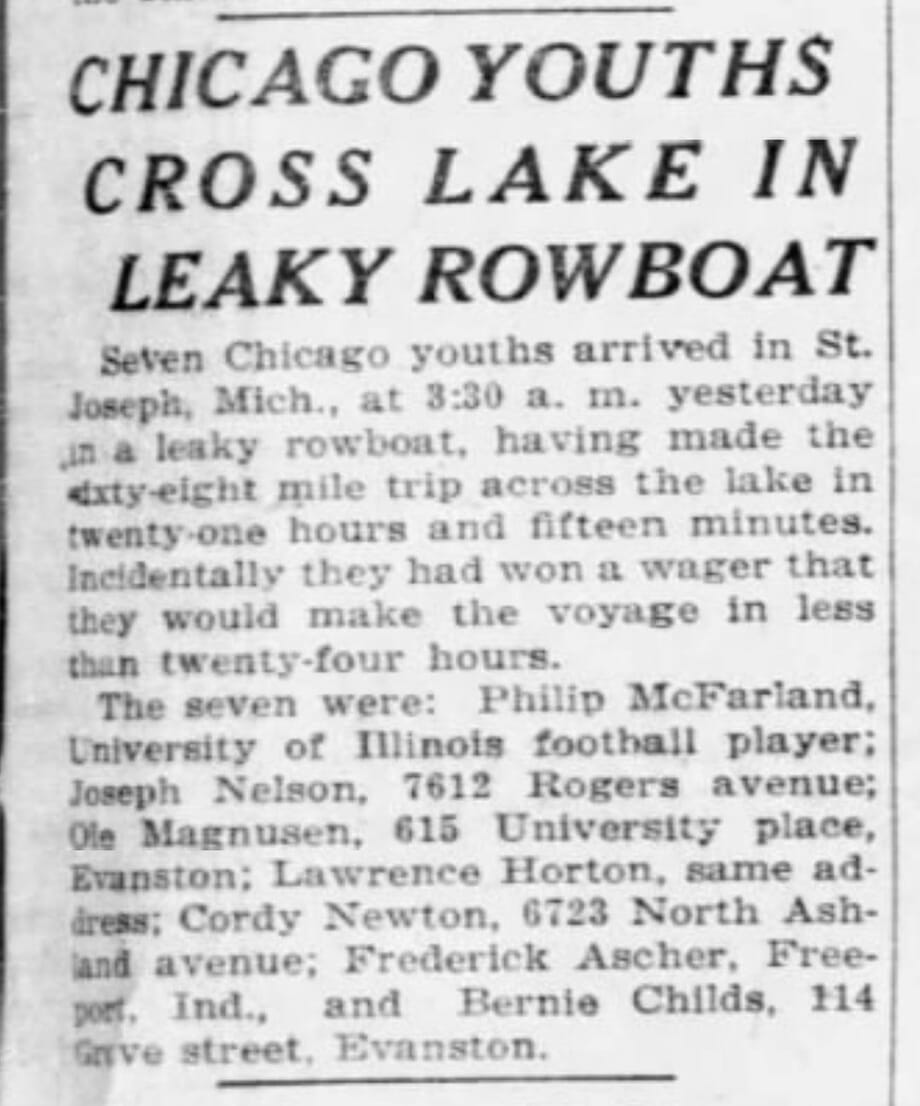
Chris Serb posted on Facebook:
Leone Beach lifeguards are just…different.
100 years ago today, 7 lifeguards from Rogers Park Beach (today’s Leone Beach) arrived at St. Joseph, Michigan after rowing across Lake Michigan in a 19-foot, eight-oar lifeboat. Believed to be the first rowboat crossing of the lake, they covered 60-plus miles in less than 22 hours, despite a leak that plagued them the entire trip.
I missed this when writing “Sam’s Boys,” because this Chicago Tribune story doesn’t say where the rowers were from or ID them as lifeguards!
But the Benton Harbor News-Palladium wrote a fuller story, picked up by the wires & with excerpts published nationally, including in the New York Times.
The guards were Phil McFarland (the “skipper” of the crew), Vernon Asher, Joe Nelson, Ole Magnusen, Larry Horton, Cody Newton and Bernie Childs.
Phil McFarland told the story, at length, to the News-Palladium:
“We started at 6:15 yesterday from Rogers bathing beach, and set a direct course for St. Joseph. We took the sail along, expecting to sail a bit. But the wind fooled us. We rowed every bit of the way. You bet your life we rowed!“
When we got about an eight [sic.] of a mile out, we saw water coming in the boat through a nail hole in the flooring. But we weren’t going to stop. We decided to go on and let her sink if need be. One man was at the pump all through the trip, bailing her out.
“We kept moving, even while eating. The men worked in shifts. Four of us were always at the oars.
“We came straight across the lake. Hit our course exactly. We didn’t go out of the way a mile.
“At 10 o’clock yesterday morning we couldn’t see land. We didn’t sight it again until 7:15 at night. Then we rowed as hard as we could row, straight for the lights on the piers. We went as fast as we could hit it until our arrival.
“But the lights fooled us. They looked as though they were only about two miles away. When we’d looked at them and then measured our distance, it seemed as though we must be going back wards.
“The coast guards here signaled us as we came rowing up the harbor. We didn’t know they had learned of our coming, and for a while thought they suspected us of being bootleggers.
“The fellows were all dizzy as soon as they stepped out on the docks. But not in the boat. We could have rowed miles farther.
“We all had a good time. I’d just as soon do it again. If the boat had not sprung that leak, we would row back.
“Instead, I guess we’ll ship her back on one of the lake steamers, and go along with her, tonight.”
“How did you happen to make the cruise?” the skipper was asked.
“All the boys are life guards over there,” he replied. “They helped pull out about 150 people this summer, and we thought we’d celebrate. We planned to make the trip last summer, and told some folks we bet we could row across the lake. They all kidded us and thought we were “fish.”
“So we asked the boss, T.R. Daly, superintendent of all the beaches in Chicago, if it would be all right. He said ‘Go ahead!’ So we went.
“All the credit of the trip goes to him. He had the boat overhauled, and equipped for the cruise. Hired a carpenter and everything.
“We were going to buy that carpenter a box of cigars until we got out a ways and discovered that leak.”
“Did you meet any boats on the way over, skipper?”
“Yes,” McFarland said. “We met Miss Chicago, of Chicago, but her captain wouldn’t stop. We wanted to get our bearings from him, but I guess he thought we were pirates or something. We did look sort of rough, I suppose. Anyhow, he just circled around us, and yelled that we were way off our course. If we had followed his directions we’d have been passed two steamships, too, but they were far off.
”After reaching the other side, McFarland and his crew ate a giant meal, then checked into a hotel and slept. They returned with their leaky boat on the steamer “City of St. Joseph” the following night.
- Three years later, in 1924, McFarland would be Rogers Park’s head lifeguard.
- Sam Leone (who in 1921 was a guard at Clarendon Beach) succeeded McFarland in 1926, and throughout his 40 years at the helm emphasized the importance of rowing. Many of Sam’s lifeguards became rowing champions.
- The tradition continued after Sam’s death, when Rogers Park Beach was renamed Leone Beach.
In 1981, lifeguard John Gladych rowed from Leone to North Avenue Beach – a round-trip of 16 miles – in 4 hours 40 minutes, leading Lifeguard Captain Dave Cicero to write in the beach’s journal:
“This awesome display of intestinal fortitude has been umatched in my era.”
As a 20-something Leone lifeguard, I duplicated Gladych’s feat in 1998.
So did Leone guard Bret Renaud, a year or two after me.
Later, Bret and I talked about rowing across the lake– just the two of us, in a four-oared boat. But life, school, and work all interfered, and our dream was deferred.
Bret and I thought we’d be pioneers, achieving a previously unheard-of feat. Little did we know of McFarland and his crew, who set the course 100 years ago, in 1921, and whose feat, to my knowledge, has never been repeated. Cheers, Phil. Your feats may have been forgotten for decades, but we appropriately remember you today.
Lifeguards for Life!
